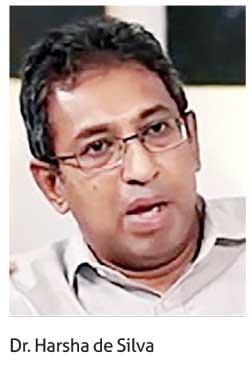15 Nov 2021 - {{hitsCtrl.values.hits}}
By Nishel Fernando
While raising concerns on potential policy confusions within the Budget 2022, Opposition party lawmaker and economist Dr. Harsha de Silva on Saturday unleashed a verbal barrage on Budget 2022 presented by Finance Minister Basil Rajapaksa a day ago, cautioning that the budget would worsen the income inequality in the country with regressive tax policies and interventionist foreign exchange polices with no practical plans to address burning issues in the economy.
 Taking part in the budget debate on Saturday, de Silva charged that the government failed to present a single proposal to close the widening income inequality gap between the rich and the poor amid the rising inflationary environment.
Taking part in the budget debate on Saturday, de Silva charged that the government failed to present a single proposal to close the widening income inequality gap between the rich and the poor amid the rising inflationary environment.
“No vision, nothing to address major structural issues of fiscal and balance of payments deficits. No new plans on investments, exports, technology and innovation; nothing to address unbearable cost of living. Only politics,” he said.
Instead of moving towards direct taxes such as wealth taxes to cut the fiscal deficit while addressing the income inequality, he remarked that the government resorted to regressive tax policies, further complicating the current tax structure.
“There were no progressive tax policies such as wealth taxes included in the Budget 2022. The government expects the largest tax income increase from a turnover tax called Social Security levy. The Finance Minister in his speech mentioned that the tax rate would be 2.5 percent, but, in books (technical note) it is 3 percent,” he said.
As there are no laws restricting companies from passing tax increases to the consumer, Dr.de Silva argued that these tax increases would be passed on to the consumer, driving the cost of living to unbearable levels.
He cited the government’s import substitution drive came into effect in late 2019 with sweeping tax reductions as the root cause of high inflation, rising fiscal deficit, US dollars shortages and widening income inequality.
“The government reduced taxes in 2019 without any scientific basis. The analysts warned of Rs.500 billion revenue loss to the government. However, any of these tax benefits were not trickled down to the consumer, but all were grabbed by big businesses,” de Silva pointed out.
As the government moved to impose import substitution policies as the next step, he noted that this also led to high inflation while benefiting a few.
“We warned that import substitution would ultimately fail, as it’s not possible in a modern globalised economy. It only leads to lower productivity and making our products globally uncompetitive. Further, we warned of high inflation from these policies,” he added.
He pointed out that the cost of essential goods skyrocketed as a result of these measures, forcing the government to move into a strict price control regime. However, with the failure of this price control regime, he remarked that the government is now moving closer to neoliberalism by completely moving away from market regulation.
He highlighted that self-inflicted issues such as fertiliser shortage occurred due to the import ban on agrochemicals to be the key reason for current high inflation and growing concerns on the country’s food security. Although, the government promised to compensate farmers for output losses due to the ban, he noted that funds were not allocated in the budget for such a move. “The government failed to allocate any funds to compensate farmers for the expected losses in output due to the ban on importation of agrochemicals. The harvest is declining by 40-60 percent range at the moment,” he stressed.
Similarly, he noted that the government’s determination to maintain interest rates on government securities forced the Central Bank to purchase these securities amid lower demand from the public. He added that low interest and high inflation environment led to an erosion in savings of the depositors.
Commenting on the impact of COVID-19 on the economy, he asserted that actual COVID spending of the government was limited to a little over Rs.200 billion and the country received similar level of funding from foreign bilateral and multilateral partners for that.
Commenting on the foreign exchange policies of the government, he pointed out that the current mandatory export conversation rule at over-valued rate is in contradiction with the government’s plan to support freelancers to grow service exports as well as plans to increase foreign direct investment inflows (FDI).
“Who are the investors going to come to Sri Lanka when the government forcibly converts their dollars into rupees?” he questioned.
17 Nov 2024 1 hours ago
17 Nov 2024 3 hours ago
17 Nov 2024 3 hours ago
17 Nov 2024 6 hours ago
17 Nov 2024 7 hours ago